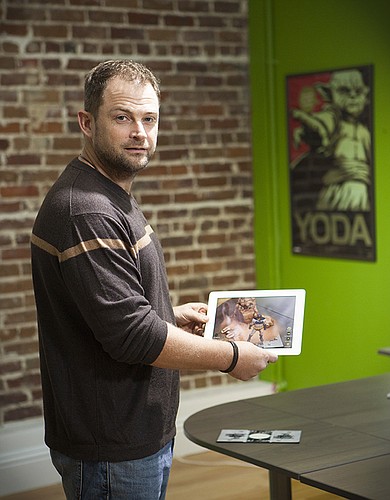- November 24, 2024
-
-
Loading

Loading

Brothers Beck and Barry Besecker founded St. Petersburg-based Marxent Labs in June 2011. It has grown 100% every year over the last three years in both revenue and people, according to Beck Besecker. The company reached 40 employees and $4 million in revenue this year and expects to double both again next year. Beck handles marketing and sales while Barry concentrates on the technical side. “Do you know Star Trek?” Beck Besecker asks. “Our whole purpose is to create a holodeck.”
One of the company's latest creations was a mobile tool to help consumers visualize Azek decking and railing products in their own backyard, with the ability to change decking options, even down to the texture of the wood, he says. Marxent's app builds a virtual deck in your backyard to “show you what it looks like in context,” Besecker says. What makes it even more unique is the app's ability to change the look of the environment around you as you walk across the virtual deck holding a mobile device.
The company's Crowdrise Giving Tower was recently featured on the “Today” show. The app allowed people to build a virtual tower together, with each person who donated getting their name on a brick. The campaign raised $2 million in three days.
“Hundreds of companies build apps,” Besecker says. “What we do is so specialized, that almost nobody can do it. Augmented reality is such a well developed niche.” Though competitors may focus on augmented reality for publications or events or games, right now, Marxent is alone in building augmented reality for commerce, he says.
Marxent's apps range in price from $50,000 to $500,000. But Besecker says the cost doesn't deter customers “It's pretty much like showing a magic trick. It performs a very utilitarian purpose and definitely holds your attention with cutting-edge technology.”
Besecker has a lot of experience in technology marketing. Prior to starting Marxent, he was chief development officer at St. Petersburg-based Catalina Marketing Corp. Working for the company, he oversaw so many mergers and acquisitions “that I got jealous of the young guys coming in and pitching things,” he says. Prior to that, he founded Copient Technologies, a marketing technology firm that collected data from checkout kiosks, which was bought by NCR Corp.
To start Marxent, the Besecker brothers self-funded the venture with $300,000 each and pitched it to investors, bringing on Detroit Venture Partners and Boston-based Stage 1 Ventures as major backers. Today, the company has secured three rounds of funding, raising $1 million in the first round, $800,000 in the second round, and another $1 million in the recent third round.
Beck Besecker says the biggest challenge has been finding candidates with the right skill sets. It has become easier as they've brought more people on the team because they can tap into that network.
“We're tucked away in Ohio and St. Pete where nobody expects a high-tech company,” he says.
To spread the word about its work, the company advertises through Google Adwords and invests time in content development and search engine optimization. According to Besecker, “Customers just find us and fill out a Web form.” The trick is continuing to post compelling content, he adds. All employees are required to contribute content each month, whether through a blog or a video post.
The company's clients range from SanDisk, to Hess and Speedway, to Dell, to Warner Bros., to Pepsi.
The thing the Beseckers are most proud of, however, is the culture they've built at the company. “We're clear about what it is,” Beck Besecker says. “If you're not into video games, comic books, sci-fi, this would not be a fun place to be for you.” In interviews, they ask about candidates' favorite superheroes and movies.
Every Friday morning, the company has a standup meeting where each employee shares three things accomplished. They also frequently send out “Moments of Zen,” which is basically an opportunity when they can poke fun at each other. Each year there's an award for the best intentional attempt at humility, Besecker says. Every meeting has to have a point and no meeting can be scheduled for more than a half hour. The brothers believe in a flat organization, according to Beck Besecker. “We let people take risks, screw up, and move on because it is faster to learn that way.”
— Traci McMillan Beach, Tampa Correspondent